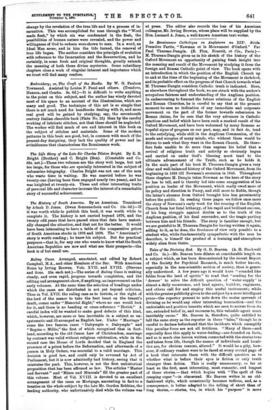La Renaissance Catholiguo en Angleterre au %IP. gaols. Premiere Partie,
" Newman et le Mouvement d'Oxford." Par Paul Thureau-Dangin. (E. Plon, Nourrit, et Cie., Paris.)— M. Thureau-Dangin gives us in his sketch of the history of the Oxford Movement an opportunity of gaining fresh insight into the meaning and result of the Movement by studying it from the foreign and Roman Catholic point of view. The book opens with an introduction in which the position of the English Church up to and at the time of the beginning of the Movement is sketched, and its probable effect on the progress of that Church towards what M. Thureau-Dangin considers Catholic truth is indicated. Here, as elsewhere throughout the book, we are struck with the author's scrupulous fairness and understanding of the Anglican position. In endeavouring to forecast the future relations of the English and Roman Churches, he is careful to say that at the present moment he sees no indication of any immediate and corporate movement on the part of the former towards submission to Roman claims, for he sees that the very advances in Catholic practices and belief which have been such a marked result of the Oxford Movement, and have been welcomed by many Romans as hopeful signs of progress on our part, may, and in fact do, tend to the satisfying, while still in the Anglican Communion, of the needs and scruples of many minds, who without them would be driyen to seek what they want in the Roman Church. He there- fore feels unable to do more than express his belief that a revival of religious truth and activity so obviously begun and carried on under God's blessing must tend to the ultimate advancement of the Truth, such as he holds it. In the main part of his book M. Thureau-Dangin gives a very clear and well-balanced history of the Oxford Movement, from its beginning in 1833 till Newman's secession in 1845. Throughout these chapters M. Dangin takes Newman as the hero of the story he has to tell, and is thereby led into some exaggeration of his position as leader of the Movement, which really owed more of its policy and direction to Pusey, and still more to Keble, though the latter's absence from Oxford brought him less prominently before the public. In reading these pages we follow once more the story of Newman's early work for the rousing of the English Church from her fatal lethargy, of his rapid and brilliant success, of his long struggle against doubts as to the truth of the Anglican position, of his final surrender, and the tragic parting between him and his friends. The story is familiar enough, but we are grateful to M. Thureau-Dangin for having written it again, adding to it, as he does, the freshness of view only possible to a student who, while fundamentally sympathetic with the men he describes, is himself the product of a training and atmosphere widely alien from theirs.






















































 Previous page
Previous page